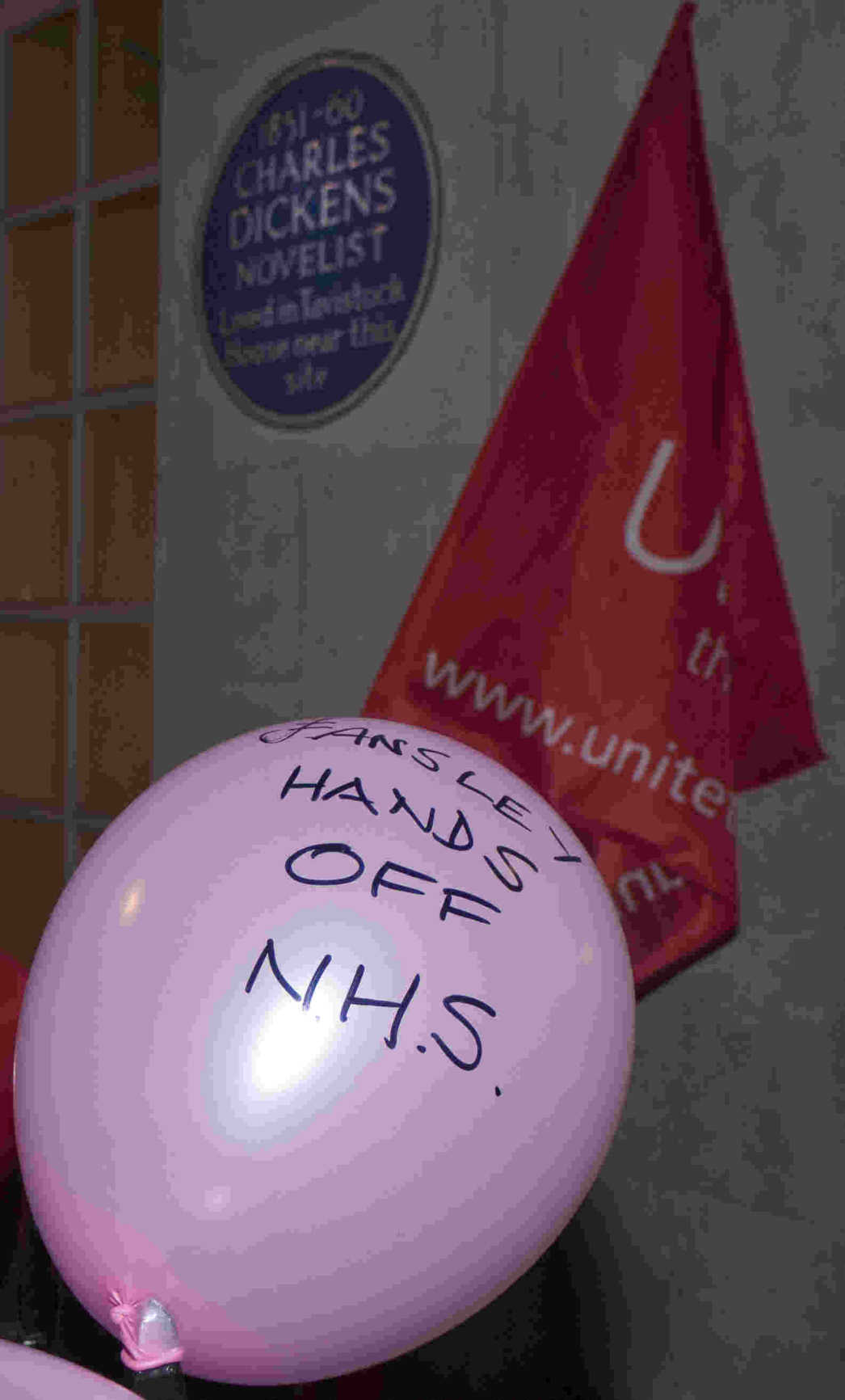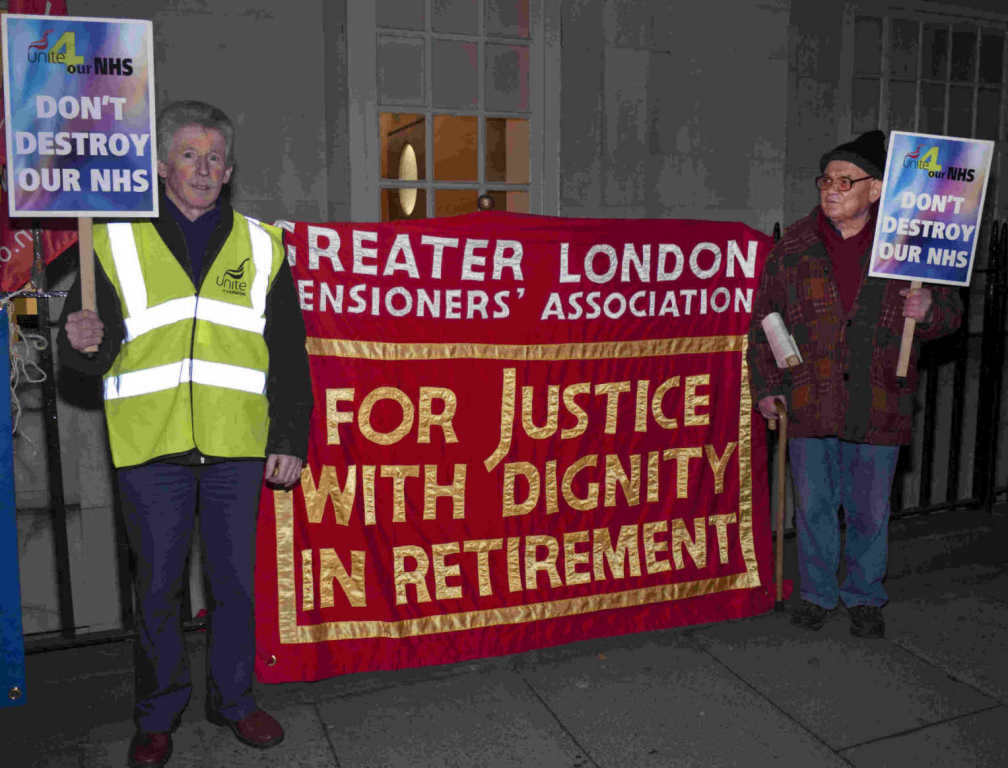Charles Dickens (1812 to 1870) is respected as a leading English novelist who wrote largely about social reforms and his commemorative plaque sits close to the British Medical Association, the site of intense public campaigning on Thursday 17 February 2011.

Keep Our National Health Service Public (KONP) is a national group and they joined together outside the BMA where the Government’s Public Health Bill was being debated. The Health and Social Care Bill leads on from the White Paper titled: ‘Equity and Excellence: Liberating the NHS’ and is likely to become law unless this consultation period is able to make successful challenges about the absurdities, inaccuracies and long term damage and financial costs these proposals will have on the National Health Service .
Bronwen Handyside is the lead organiser for KONP in Hackney and has worked tirelessly since the New Year to raise the public’s awareness about the impact the Government’s changes will have on the NHS and patients. She explained that the Bill – as it is proposed, is likely to be the end of the NHS as a service. Hackney’s MP Diane Abbott is understood to not be in favour of the NHS changes and she also attended the debate at the BMA, saying hello to campaigners on her way into the building.
The Government’s paper allows for GP’s to commission services, which many are opposed to. The general feeling is that doctors are primarily motivated to help with health needs and save lives and are less motivated to make profits for private pharmaceutical companies. The paper also allows for different types of treatments to be packaged together and sold as a product to profit making pharmaceuticals and other private companies.
For the service user, this will see the development of a two-tier health care system where patients with money can buy health plans via Bupa, Aviva and Saga. Those patients who cannot afford to pay privately will be left to wait and as there is only a finite amount of hospital beds in the country such people are unlikely to be treated before those using private health care packages.
Illnesses that are less profitable, like alcohol services, drug dependency, mental health therapies etc, where treatment is often over a long period of time, these products will remain within the NHS’ financial control. As a business, the NHS has been largely successful because where it made a profit on treatment it was able to redirect that money to cover treatments that were generally more costly. By splitting services up into profit driven packages, it is clear to see that within a few years and because the NHS is only delivering treatments that are more costly, the business of the NHS is likely to collapse.
Despite these legitimate concerns the current Government continues their rhetoric, stating the changes are necessary. Fundamental to their claim is that private companies can deliver the same treatments for less because they run more ‘efficient’ business models. There appears conflicting evidence to support this claim. In reality it is either the NHS or the PCTs that have been running the NHS since the 1990’s. Therefore, to evidence their statement they are effectively referring to the efficiency savings created by the Primary Care Trusts (PCTs).
However, this Bill will see the instant decimation of PCTs – the very same engines this Government claimed was at the forefront of NHS efficiency. Every other Government or public body has to use evidence base practise to implement changes into organisations, yet here we have the ConDem Government citing as evidence PCT’s successes – yet in the same Bill it annihilates the very same PCTs! This leaves only one question: Is this Health Bill simply illogical or utter negligence?

Seventy nine year old pensioner Cyril Forby, a retired ‘chippy’ from Tower Hamlets and a member of the Greater London Pension Association, is equally disturbed by the Bill and as a consequence has joined the KONP campaign. He explained he currently has ten different tablets a day. Under the Bill some of his treatments will require payment. He also referred to his bank, Santander who is ‘now’ offering him the opportunity to buy private health care. On a pension of just over £100 per week, Mr Forby will have to make some very difficult choices, either buy his medication from the NHS which he said would cost about £30 per week or buy health care for roughly the same and receive his drugs for free. Either way the changes in the NHS will not simply be a financial failing to our public health service, it will also see many of our pensioners and other vulnerable groups having to search for money to get treatment.
As the BMA meeting to debate the Bill came to a close at 8pm, those who attended were polite to the campaigners as they left. None were sure of the outcome and all await the official findings that will be released after another Special Meeting on 15 March 2011. Despite this KONP continue their optimism: that the BMA will dismiss the Bill and failing this that GP’s will simply not implementing the processes – forcing the Government back to an early review.
KONP campaigns continue up and down the country and most are planning to join what is fast becoming, ‘the international TUC demonstrations in London on 26 March 2011’. Despite his difficulty with walking and his overall declining health, Mr Forby promises to participate on 26 March to save his National Health Service. We owe it to him, our elders, our families, our communities and our NHS to ensure he does not walk this journey alone.
Report by Teena Lashmore
